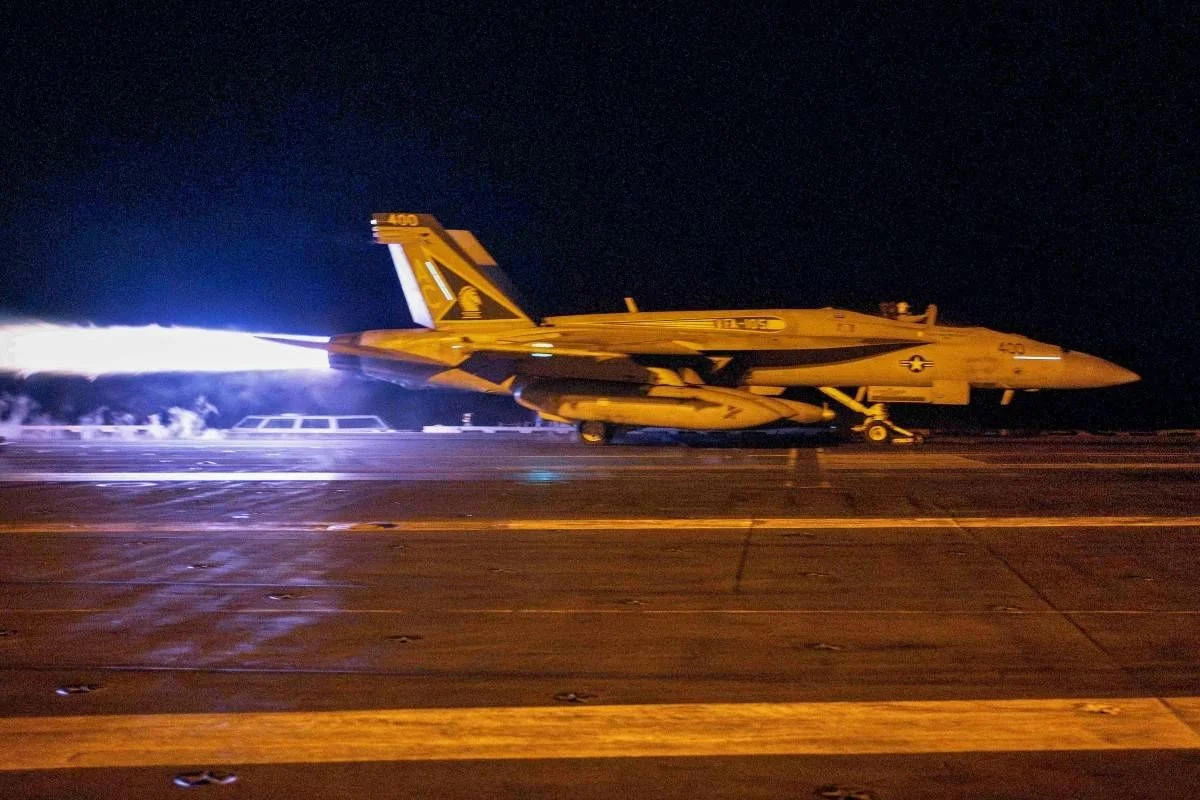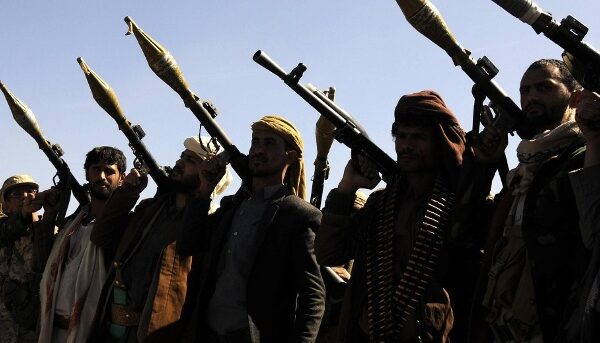Richard Hall
Friday 19 January 2024
The US is carrying out airstrikes in three countries across the Middle East. It has sent billions of dollars in military hardware and is providing tactical support for its closest ally in the region, which is embroiled in a war against one militant group and almost daily skirmishes with another on its northern border. US forces in two of those countries have been attacked more than 150 times in the last three months, and the de-facto ruling power in an impoverished country in the Red Sea has brought international shipping there to a grinding halt.
It was not announced with great ceremony, as previous American adventures in the Middle have been – in fact, it was not announced at all. But the US is now embroiled in a regional war against an alliance of Iran-backed militant groups spread from Syria to Yemen. That war is being conducted with little congressional oversight, and with little acknowledgement from the Biden administration of the scale of the fighting.
It is an outcome that the Biden administration has claimed to have worked hard to prevent, but analysts say that the president’s unconditional support of Israel’s war against Hamas, in retaliation for the Palestinian group’s attack on 7 October, has ignited a tinderbox that will be difficult to contain.
“Unfortunately, we are now deep into a regional war and all the parties involved have made the worst possible miscalculations,” says Thanassis Cambanis, senior fellow and director of Century International, who warned of such an eventuality in the early days of the Israel-Hamas war.
Indeed, the Biden administration’s two main priorities in the aftermath of the Hamas attack seemed incompatible from the start. Mr Biden promised unconditional support for Israel’s war in Gaza, and to prevent that conflict spiralling into a wider regional war. But Mr Cambanis argues it was precisely the Biden administration’s support for the war in Gaza, and refusal to use its leverage to pressure Israel to end it, that fuelled the regional escalation.
“The most important step to calming the wider regional conflict is ending the war in Gaza. It has been thus from the very beginning,” he tells The Independent. “The US retains a lot of leverage it has sadly chosen not to use and it continues to be a central driver of the conflict.”
In the early days of the conflict, Mr Biden achieved the first of his objectives – supporting Israel’s ability to attack Hamas in Gaza – by sending hundreds of millions of dollars of military supplies to Israel, bypassing Congress to do so speedily.
Then, to deter any Hamas allies from joining the fray, the US sent two aircraft carrier strike groups to the eastern Mediterranean. The US was particularly concerned about the Lebanese group Hezbollah, which fought a devastating war against Israel in 2006. In an interview given just days after the Hamas attack, Mr Biden issued a stark warning: “To any country, any organisation, anyone thinking of taking advantage of the situation, I have one word: Don’t.”
Those words would fall on deaf ears, however.
Israel’s fight with Hamas in Gaza is at the centre of this conflict, but it is also just one part of a greater proxy war between rivals Israel and Iran. The Islamic Republic has spent years building a network of allied militant groups opposed to Israel under a concept referred to as “unity of the fronts”. Those groups – which include the Syrian government, Hezbollah in Lebanon, Hamas in Gaza, Houthi rebels in Yemen and various Shia militant groups in Iraq and Syria – have been furnished with military training, financial support, missiles, and the ability to make their own missiles. All of them have now been drawn into the fight in some form.
As Israel pursued its war against Hamas with increasing ferocity, and the civilian toll rose by the day in the thousands, attacks against US interests spiked across the region. US military officials have counted more than 150 attacks against its troops in Iraq and Syria since 17 October. In early December, the US embassy in Baghdad was targeted with rocket fire.
Those attacks have continued as a steady drumbeat in the background of the devastating Gaza war. But it was the Lebanese group Hezbollah that gave the US the most concern.
Hezbollah and Israel have fought increasingly fierce skirmishes on the border for some months now. So far, the two have managed to prevent an all-out war, but that may not last forever. Speaking in early January, Benny Gantz, a member of Israel’s war cabinet and former defence minister, told reporters that “the stopwatch for a diplomatic solution is running out”.
“If the world and the Lebanese government don’t act in order to prevent the firing on Israel’s northern residents, and to distance Hezbollah from the border, the IDF will do it,” he said.
The US might have been able to deal with the small-scale attacks against its forces in Iraq and Syria. It was involved in Gaza, but only indirectly. And Hezbollah was largely avoiding action that could spark a wider conflict. But the biggest problem for the US came from an unexpected place.
The entry of Yemen’s Houthi rebels has opened a new front in the region for US forces. The Houthis, an Iran-backed group that controls most of Yemen and has survived a years-long US-backed bombing campaign by Saudi Arabia, inserted itself into the fray on 19 October, nearly two weeks after the Hamas attacks, when Israel’s bombing campaign against Gaza was well underway. On that day it fired a barrage of missiles and drones towards Israel and said the attacks would continue until the war stopped and humanitarian aid was delivered to Gaza.
For weeks these missiles, supplied by Iran, continued to be fired towards Israel. All of them were intercepted either by Israeli air defence or US warships in the region. Then, on 14 November, Houthi leader Abdulmalik al-Houthi warned his group would target Israeli ships in the Red Sea and the Bab al-Mandeb Strait. Less than a month later, the group started attacking all ships that it claimed were heading to Israel. In reality, it also targeted ships with tenuous or no links to the country at all.
Many shipping companies suspended passage through the Strait and global shipping was severely disrupted as a result. Global trade dropped by 1.3 per cent in December as a result of the disruption, and the number of shipping containers passing through the Red Sea fell by 60 per cent.
On 11 January, after the Houthis ignored repeated warnings, the US and the UK carried out air and missile strikes against Houthi targets in Yemen. The strikes targeted the capital Sana’a, as well as Sa’ada, Hajjah, Hudaydah, and Taiz governorates. The Pentagon says 60 targets were hit using more than 150 precision-guided munitions. “These targeted strikes are a clear message that the United States and our partners will not tolerate attacks on our personnel or allow hostile actors to imperil freedom of navigation,” US president Joe Biden said.
With that, the US went from indirect involvement to a new bombing campaign in the Middle East. President Biden, outlining the justification for the strikes, said they intended to send “a clear message that the United States and our partners will not tolerate attacks on our personnel or allow hostile actors to imperil freedom of navigation in one of the world’s most critical commercial routes”.
The US also redesignated the Houthis as a terror group, after the Biden administration had taken the group off the list in one of the first acts after entering the White House.
The strikes don’t seem to have halted the attacks, however. In the last week, there have been 30 attacks by the Houthis on shipping in the Red Sea and the Gulf of Aden.
Farea Al-Muslimi, a Yemeni writer and research fellow at Chatham House who has spent years writing about the US-backed Saudi bombing campaign of Yemen, and US strikes against Al Qaeda before that, believes the US is fighting a losing battle.
“Biden is in one of these moments where it’s damned if you do, and damned if you don’t. If you let the Houthis get away with this, it’s dangerous and bad for business. Then if you bomb them, you are escalating and opening another front line,” he said.
“But they have tried bombing for many years, with al-Qaeda. The Saudis tried it. And it doesn’t work in Yemen. So it seems to be that the policy of the current US administration is to be in a regional war without calling it one,” he added.
Mr al-Muslimi believes the US and others may have misunderstood, and perhaps underestimated the Houthis. Far from being a mere proxy of Iran, they have their own strategic reasons for stepping forward at this moment.
“First, when they say they support Palestine, they really mean that. They ideologically believe in that and think they can help,” he said.
“For them, Gaza is a chance to re-emerge as a power player. Can you think about it right now? Twenty years ago they were in flip-flops, now they are demanding the withdrawal of forces from Gaza and halting shipping in the Red Sea.”
Despite the continuing airstrikes against Houthi targets on Thursday, the Biden administration has downplayed the idea that the US is already engaged in a regional war.
“We don’t seek war, we don’t think we are at war. We don’t want to see a regional war,” the Pentagon’s deputy press secretary Sabrina Singh said at a briefing on Thursday.
Colin P Clarke, senior fellow at the Soufan Center, described the many overlapping crises in the Middle East as a “perfect storm” for the Biden administration, and believes the reason why they are reluctant to concede the seriousness of the conflict may lie with domestic concerns.
“The stated goal of the administration from early on in the Gaza war was to prevent the conflict from spreading and becoming a regional war. Admitting we’re in a regional war would be akin to admitting a policy failure, not something you want to hand your opponents in an election year,” he said.
“So they just don’t admit it, and continue to plod forward while hoping this winds down, that seems to be the ‘strategy.’”
In the meantime, President Biden appears to be committed to continuing to bomb Yemen until the attacks in the Red Sea are halted.
When he was asked by a reporter if the airstrikes in Yemen were working, he replied tersely: “Well, when you say ‘working’ are they stopping the Houthis? No. Are they going to continue? Yes.”






